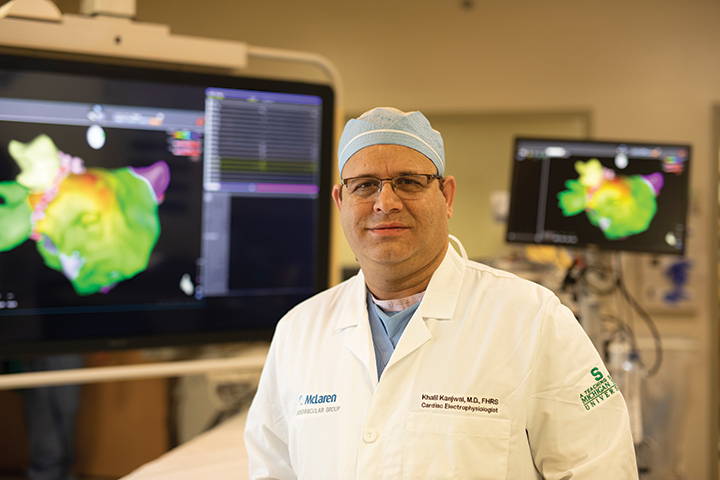Author: Lindsey Ulrich

If you don’t know someone who has experienced Atrial Fibrillation, commonly referred to as AFib, odds are you will at some point. Estimates show up to 12 million people may be affected by AFib by the year 2050.
AFib is a very common heart rhythm disorder that can have a major impact on your quality of life, leaving you feeling fatigued with shortness of breath and an increased heart rate, and can lead to an increased risk of stroke and heart failure.
With that in mind, here are three things you need to know when it comes to AFib and your health.
The population facing AFib is changing
In the past, AFib was a disease mostly found in older populations, but McLaren Greater Lansing Cardiologist Khalil Kanjwal, M.D., FHRS CCDS, FACC, says that’s changed, and he’s seen patients as young as 40 with AFib.
“The increase is due to people not eating healthy, not exercising, and not managing other conditions like hypertension, diabetes, and sleep apnea,” said Dr. Kanjwal.
You could have AFib and not know it
Those experiencing AFib sometimes have a rapid heart rate, or palpitation. Depending on the individual, the palpitation may occur as infrequently as every six months, monthly or in some cases, or they may be in AFib at all times.
“When someone is having a rapid heart rate, they will feel like their heart is out of sync and they’ll tell you their heart feels fast or irregular,” said Dr. Kanjwal. “People with AFib are unique because some may have no symptoms. There is a large group of people who may not know they are in AFib and I worry about them because they are at risk of stroke.”

There are many advanced treatment options available
Many patients with AFib are prescribed blood thinners to help reduce their risk of stroke, but over time these medications can have serious side effects and negatively affect the patient’s eyes, liver, lungs, skin, and thyroid.
“Regardless of whether AFib patients have symptoms or not, they need to be treated with blood thinners. I stress this with all my patients and take it seriously because I don’t want any of my patients to have a stroke,” said Dr. Kanjwal. “People who have symptoms will benefit from undergoing an ablation procedure, which is the most effective way of controlling AFib.”
Thankfully, a talented electrophysiology team under the leadership of Dr. Kanjwal is helping more patients than ever by using the latest advanced procedures.
The catheter ablation procedure is used to electrically isolate the areas with electrical signals within a patient’s heart that cause AFib. The minimally invasive surgery utilizes a catheter to scar or destroy tissue that is causing incorrect signals in the heart.
Alternatively, for those suffering from non-valvular AFib and cannot tolerate being put on blood thinners, McLaren Greater Lansing now offers patients with the WATCHMAN™ Left Atrial Appendage Occlusion (LAAO) Implant. Implanting the LAAO device is performed through a small incision in the groin area. Once the device is inserted, the heart will grow tissue around it over time, completely plugging the opening of the left atrial appendage.
“We can seal off the left atrial appendage to keep harmful blood clots from forming and entering the blood stream and causing a stroke,” said Dr. Kanjwal.
Dr. Kanjwal said that people on blood thinners who think they may have a bleeding issue, should continue to take their medication, but seek advice from their treating physician and discuss other treatment options.
Learn more information about the cardiology services at McLaren Greater Lansing.
See more articles on health and wellness.